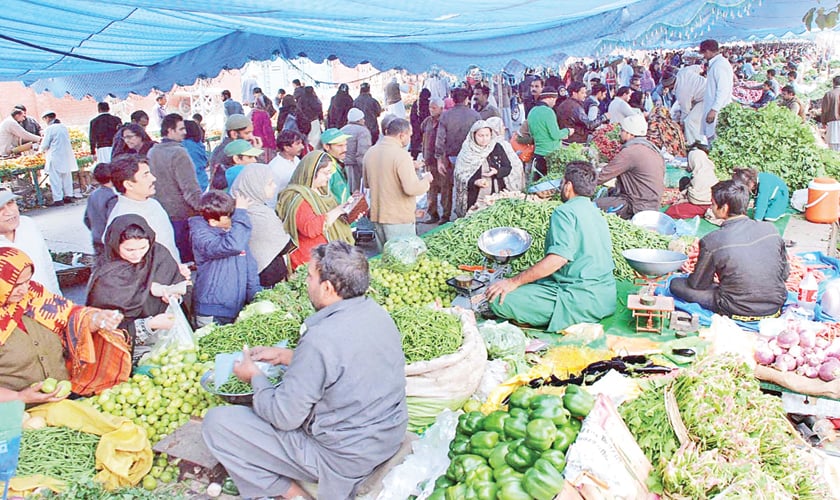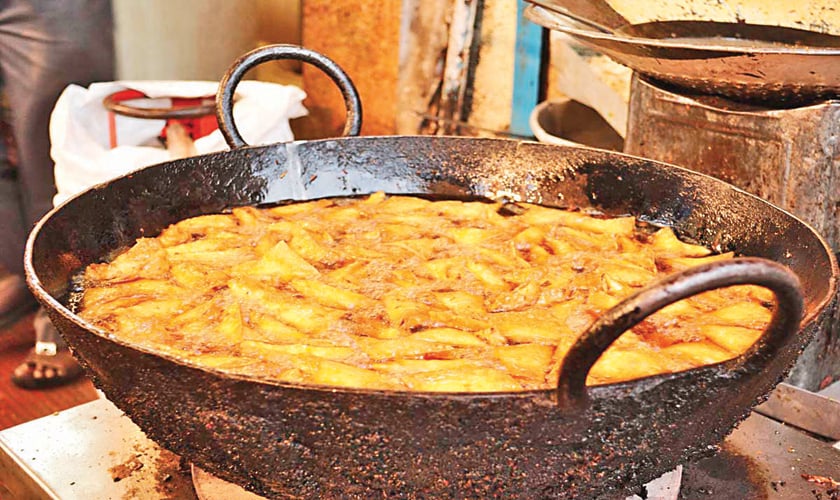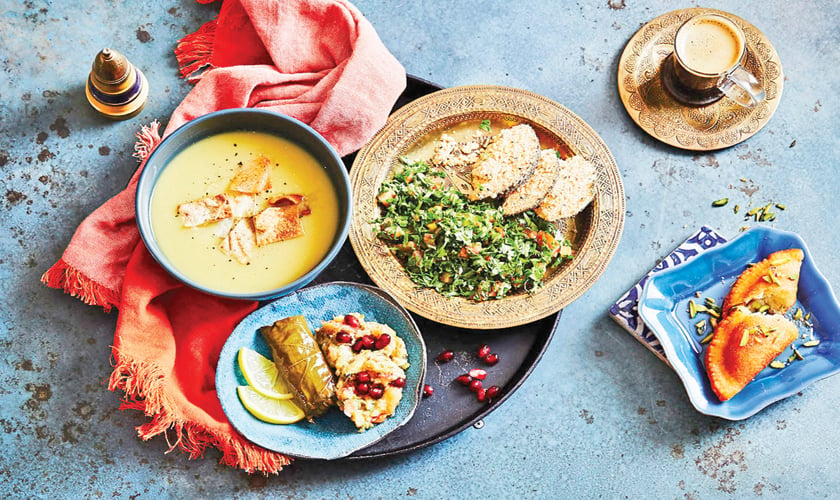The rising price tags on essential goods every year make it difficult for women to manage their budgets in Ramazan. You! takes a look...
The rising price tags on essential goods every year make it difficult for women to manage their budgets in Ramazan. You! takes a look...
During the month of Ramazan, the food pattern of every household almost becomes the same. Specific dishes are consumed at iftari and sehri and there is an increased demand for fruits, vegetables and other food items. However, instead of giving relief to consumers during the Holy month, we see a constant rise in prices of essential goods every year. And this year is no exception. With inflation, it has become difficult for women to manage their budgets in Ramazan. In this regard, You! talks to a few known personalities who share their views on various factors that affect the monthly budget during Ramazan...

Mrs Asma Ali Shah, Chairperson of Asghar Ali Shah Foundation, talks about the double standards of people in Ramazan. “On the one hand, we give a large chunk of money and goods in Ramazan to the needy ones while on the other, we increase prices as we view the holy month to be a season of profit making. We call ourselves an Islamic Republic but the government fails to provide any relief to the people. Just imagine, last year, the German Chancellor Angela Merkel signed a decision on June 4 to exempt owners of Islamic markets and restaurants from taxes during the month of Ramazan to allow these Islamic restaurants to lower food prices for Muslims during the holy month. But there is no such relief for the masses in our country. Fasting teaches us to feel the suffering of others but we increase the prices and add to their woes. It is sad that inflation during this month is not due to any natural catastrophe like floods or famine but due to the hypocrisy of those who deal in Ramazan-related stuff,” she laments.
Senator Khushbakht Shujaat thinks otherwise. According to her, food wastage especially during Ramazan is one of the main reasons, which directly impacts the rising prices of commodities. “There is a greater wastage of food in Ramazan which is not only against the values of Islam but it is also a waste of money especially in these testing economic times. Buy as much items as necessary. Don’t go for extra buying. When everyone will be busy in extra buying, the demand will rise and profiteers will take full advantage of the situation. Everyone knows his buying power, so I would advise women not to spend beyond their means. All family members should get together and arrange their budget accordingly. Wastage of food is sort of a cultural defect of our society. Be it marriage functions, Iftar parties or any other get together, a large amount of food is wasted. This is not the case in civilized countries. Women can play a great role in this connection. If they themselves do away with this habit and live within their budget, the children will automatically follow them and a whole change can be brought about in the attitude of the society at large. It is the lady of the house, who had to take the first step,” she stresses.

Prominent social figure Samina Iqbal Qasim says that despite our complaints about inflation, many of us spend thousands on Iftar parties and Eid preparations. “On the average, a middle class customer can be seen buying several dresses ranging from Rs 5,000-10,000 each for Eid. If we limit our buying, we can help those families that need the same amount to manage their entire month. So we need to reflect on our acts. Secondly, women need to be more practical in their approach when it comes to spending on unnecessary stuff for Eid. This is a month which makes us ponder over our deeds,” she opines.
But who is to be blamed for this price hike and why has the situation not changed with every passing year? Referring to this problem, PML-N leader Moona Abbas Sharif Khan, says, “We have developed a psyche of blaming our government for everything but in case of Ramazan price hike, we ourselves are also responsible to a great extent. It is the hoarders and profiteers who create an artificial shortage of food items due to which the prices increase. So this is something which can be better controlled at individual level by reforming ourselves. For this, we will have to change ourselves first and voluntarily keep the prices at reasonable level. There is a need for change in attitudes. We have commercialized everything to the extent that we do not even realize the sanctity of religious occasions like Ramazan and Eid and instead opt for profit making which is a pity.”
Is it really a relief?
Like every year, the government has come up with Ramazan Relief Package with subsidies worth over 1.6 billion to provide relief to the masses during the holy month. Under the package, 19 food items are provided to people through utility stores at subsidized rates. Food items include wheat flour, sugar, ghee, oil, pulses, white grams, baisan, dates, rice, squashes, black tea, milk, and spices. For this purpose, the Utility Stores Corporation has reduced prices of over 100 other items from 5 to 10 per cent by obtaining special discount from suppliers and reducing its own profit margins. However, past experience suggests that such packages fail to make a difference to the consumers. Shamim, a maid who works in Clifton, shares, “I fail to get goods from these stores as there are long queues of people at these stores. Secondly the stores are usually far away and it’s not convenient for women like me to buy stuff from there as what they save on buying from utility stores is spent on transport for carrying these items home.”
Even though, the government comes up with relief packages every year, a strange phenomenon has emerged lately. Women prefer going to supermarkets instead of utility stores for Ramazan-specific shopping. There are around 150 utility stores in Karachi, yet customers prefer going to supermarkets and warehouses for their grocery shopping mainly due to the slashing of government subsidies on utility stores. Miss Shahana, a school teacher, attributes this to non-availability of many items at the utility stores. “Due to lack of subsidies, the utility stores wait for months for buying a particular item and as such customers fail to get those items due to non availability at the stores. Moreover, the quality of items at the utility stores is also not good. There is huge rush at the stores and you have to wait for hours in the scorching heat. But at the shopping centres, there is a good arrangement and one can shop in a relaxed atmosphere,” she informs.

However, on the other hand market people attribute the price hike to the high demand and low supply of goods during Ramazan. “Because of unprecedented increase in consumption of some food items in Ramazan, the demand for these items increases while the supply is short. It is the rule of business that whenever there is a rise in demand and short in supply, the prices automatically shoot up. The wholesalers buy the items at increased prices and they sell at high prices. There is no regulatory system in place to check the difference in supply and demand which results in soaring prices of food items in Ramazan. It is because of the absence of a proper mechanism or a plan to regulate supply and demand with a view to check the prices of essential food items during this month. The government should formulate a policy at national level to keep a balance between the supply and demand of food,” concludes Tariq Ehsan, a commodity trader at Jodia Bazar.
Price check
The Consumer Price Index (CPI) based inflation also witnessed an increase of 4.94 per cent during the last month. According to a report by Pakistan Bureau of Statistics, the top food items that saw a rise in prices as compared to last year in the holy month include tomatoes 68.43 per cent, green chillies 36.22 per cent, chicken 21.6 per cent, onion 18.06 per cent, potatoes 15.48 per cent, apple 12.69 per cent, bananas 10.65 per cent and tea 8.04 per cent. Also food items that witnessed an increase in their average prices include tomatoes 128.17 per cent, potatoes 49.92 per cent, chicken 18.92 per cent, green chillies 16.64 per cent, tea 16.14 per cent, and pulse gram 10 per cent.
Watermelon, which was being sold at Rs 35-40 per kg earlier, is now available at Rs 70 for the same quantity while the cost of bananas (per dozen) has increased by Rs 40 and is now being sold at Rs 100-120 compared to Rs 80 earlier.
Similarly the cost of vegetables has also gone up. The price of lemon has seen an increase of 60 per cent as the rates have changed from Rs 160 to Rs 250 per kg now. Potatoes have risen from Rs 25 per kg to Rs 30 while the price of onion has increased from Rs 30 to 35. The prices of tomatoes have seen an increase of Rs 20, reaching to Rs 60 per kg whereas green chilies went up to Rs 130 per kilogram following a hike of Rs 40. The rates of coriander and mint leaves on the other hand have doubled and a single bunch of coriander and mint leaves costs Rs 20 now. Capsicum reached Rs 100 after an increase of Rs 80 whereas the price of garlic and ginger went up to Rs 340 from Rs 320 and 200 from 180 per kilogram, respectively.
It is unfortunate that the price hike is not limited to fruits and vegetables. What raises a serious concern is the fact that the prices of items that become more of a necessity in the month of Ramazan are touching the sky. The price of dates has been considerably increased this year. While they were priced at Rs 420 last Ramazan, they are now available for Rs 550 per kg. Gram flour, which has the highest demand in the holy month for making pakoras, has reached to Rs 160 per kg from Rs 150 per kg. Chicken on the other hand has reached to Rs 300 per kg. Before the month of Ramazan it was being sold at Rs. 275 per kg.